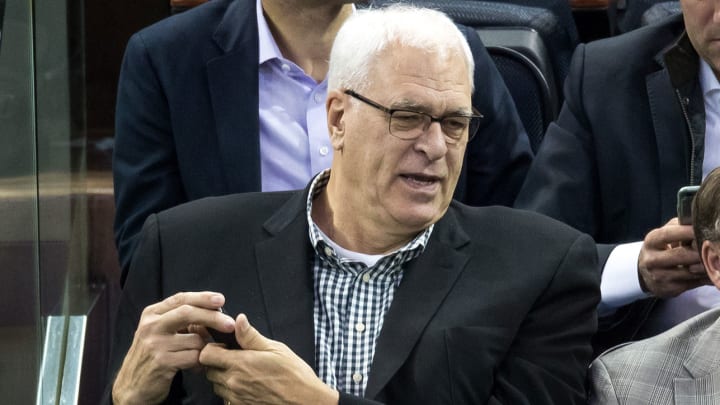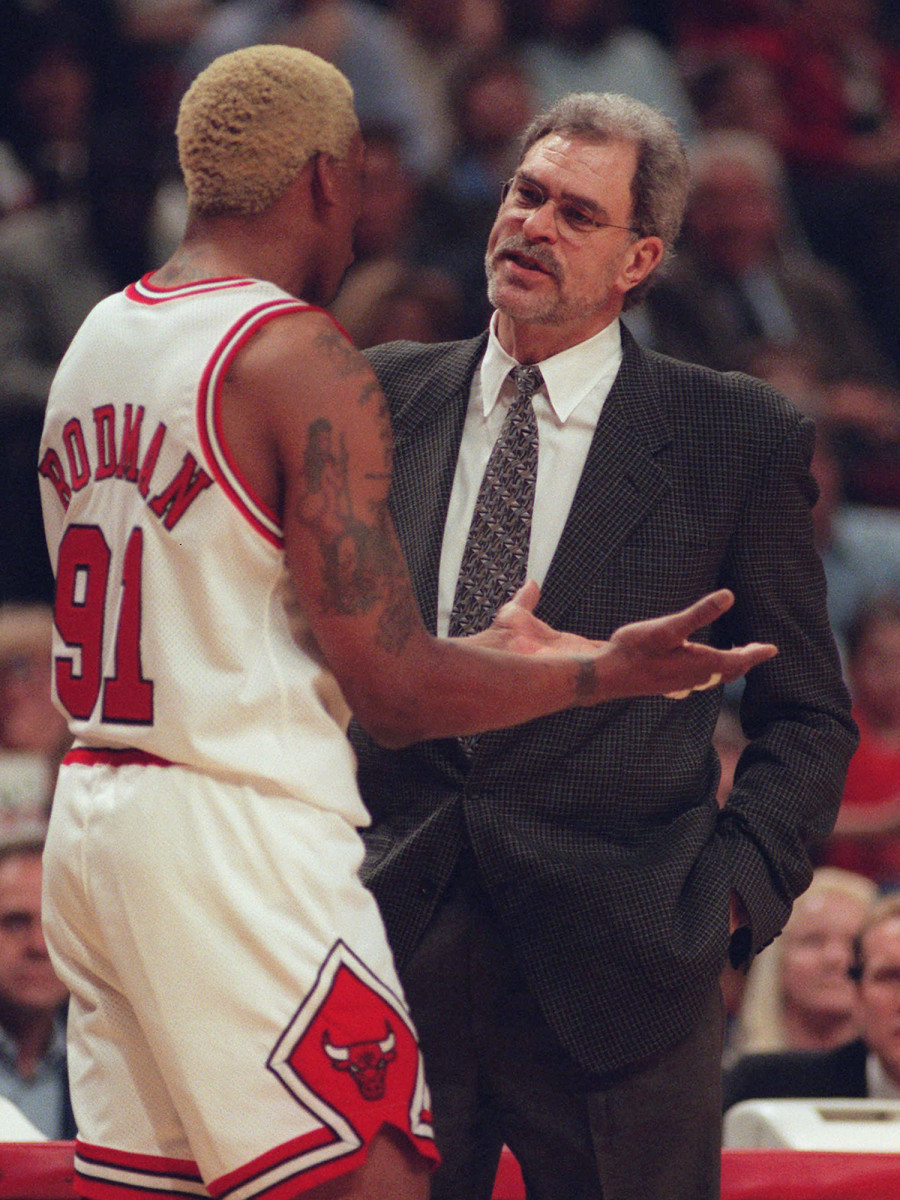The NBA Has Changed, Maybe Phil Jackson Should Too

LeBron James and his colleagues have good reason to be offended by Phil Jackson’s reference to James’s posse. But Jackson’s problem is not racism. It’s that he is stuck in the 1990s, when he was the NBA’s most valuable non-player, the triangle offense was revered and, yes, the word “posse” was casually thrown around.
Nobody can take away Jackson’s 11 NBA championship rings as a head coach, but nobody in the league is asking to see them, either. He is supposed to run the New York Knicks, not tell ESPN what he thinks of James’s friends or Pat Riley’s relationship with Dwyane Wade. You don’t see any other team presidents talk this way.
LeBron James frustrated by Phil Jackson's 'posse' comments
Now, about the word that got so much attention: posse. It wasn’t always so loaded. Look at some examples from 1999, the year Jackson became head coach of the Lakers:
• The St. Paul Pioneer Press wrote that Gary Payton “reportedly has the league's biggest posse.”
• The Philadelphia Inquirer wrote that Kobe Bryant “doesn't have a group of friends that the media calls a posse.”
• The Houston Chronicle wrote that “Toronto coach Butch Carter is tired of all the hangers-on and posse types he sees in and around the Raptors' locker room these days.”
• The Chicago Sun-Times reported that Spike Lee bought courtside seats “for nine members of his posse.”
That Sun-Times story was written by late, great African-American sportswriter Lacy Banks. So this was not just a clueless white-writer thing. Right or wrong, you could drop the word “posse” into a conversation back then without being shown the door. “Posse,” like “Negro” or “Afro-American,” is a word whose meaning and potency evolved over time.
LeBron James’s Best Path To Another MVP? Keeping Cleveland On Track
Jackson apparently missed that evolution. But he also missed some bigger ones. Even in the ’90s, it was commonly understood: a posse was a group of people who hung around just to hang around. Posses placed fun in the way of work. Posses kept players out so late, their alarms went off before they got home.
And this is where Phil Jackson showed, once again, that he has lost his handle on the modern NBA. Maverick Carter and Rich Paul are not part of LeBron James’s posse, by the definition of any era. They are ambitious people who want to make a ton of money and gain power within their sport—and they have done it extremely well. If Rich Paul is part of James’s posse, then Scott Boras is part of Bryce Harper’s posse, and nobody ever describes Boras that way.
By the way: Paul is an increasingly prominent agent. Forget the racial implications. What team president needlessly and mindlessly insults a successful agent? How dumb is that?
Jackson’s comments about James wanting “special treatment” were laughable on several levels. Jackson gave Dennis Rodman some of the most “special” treatment in NBA history, and say what you want about James, but he sure as hell does not need Phil Jackson telling him to get his priorities straight. Whatever special treatment James gets, he has more than earned, and he pays back tenfold.
In the ’90s, Jackson formed his Zen Master persona by giving non-sports books to his players and forming a bond beyond the court. It was smart and extremely effective, but it would barely be a news story in today’s NBA.

The league has changed. Players know the best coaches are on their side now. Just last week, Gregg Popovich, Steve Kerr and Stan Van Gundy went on rants against the President-elect of the United States, partly as a way to stand up for the African-Americans on their team. That will give them a lot more currency with their players than Jackson has with his Knicks.
There are exceptions in any era, but today’s NBA stars tend to be more socially aware, politically active and conscious of their place in the world than the stars of 20 years ago. And from James to Kevin Durant to Russell Westbrook, they work their butts off. They don’t need Jackson talking down to them.
Jackson was one of the great coaches in the history of American sports. Nothing he does in New York will change that. And he really hasn’t done a terrible job there—this year’s Knicks should be OK, and Kristaps Porzingis is a rising star.
For Dwyane Wade, Fantasy Is Now a Reality
But Jackson’s view of his Knicks job is upside-down. He is supposed to use his cachet and wisdom to help the Knicks, and instead he is using the Knicks to show how important and smart he is.
He keeps pushing his team to use the triangle offense, instead of understanding why today’s best teams don’t run it. He mocks the emphasis on three-point shooting instead of studying and adapting to it. He gives “his” guys Kurt Rambis and Derek Fisher plum coaching roles. He even gave Brian Shaw a shout-out in his ESPN interview. But of course, any compliment for Rambis, Fisher or Shaw is really a compliment for Phil.
One of Jackson’s most telling comments to ESPN was not about his guys or James, and it was not racially tinged. It was about Popovich and the Spurs. Jackson said: “We have no animosity. We just played against each other so many times. One time he just stuck guys in the corner and ran the twin towers and that was it. But they've evolved so much. I like the way his teams play. He's using a lot of triangle stuff, a lot of pinch post stuff. It works.”
Maybe I’m reading that wrong, but does Jackson think Popovich was a simplistic offensive coach who got smarter when he started running more of Jackson’s beloved triangle? Oddly, I have not seen this analysis anywhere else.
Why are we hearing all this now? Knicks star Carmelo Anthony told reporters, “I don't really know what was the gist of the conversation, what was the topic or why Phil was even talking about LeBron in the first place. I don't think we play them anytime soon. It's a whole month away.”
Why did Jackson talk about LeBron James, Pat Riley and the Lakers? Just a wild, off-the-wall guess here, but those are the league’s most famous player, most famous executive, and most popular team, and Jackson used to be in that conversation. He wants to be in that conversation again. He can’t get there by talking only about how the Knicks got to 4–6.
This would be a different conversation if Jackson regularly fielded questions about the Knicks. He rarely does. So why is he talking about everybody else?
Phil Jackson used to do masterful work with huge egos. Now he just has one. The truth is that the NBA players are no longer in awe of Jackson. The rest of the league does not fear him, resent him, or worry about him like it once did. He is just an overpaid 71-year-old running an average team for a lousy owner. If he wants to tell people what he thinks of everybody else in the league, he should save those thoughts for the media suck-ups and old buddies who want to hear it. Some people would call them his posse.
